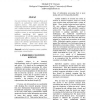Free Online Productivity Tools
i2Speak
i2Symbol
i2OCR
iTex2Img
iWeb2Print
iWeb2Shot
i2Type
iPdf2Split
iPdf2Merge
i2Bopomofo
i2Arabic
i2Style
i2Image
i2PDF
iLatex2Rtf
Sci2ools
IEEEICCI
2002
IEEE
2002
IEEE
From Embodied Cognitive Science To Synthetic Psychology
One new tradition that has emerged from early research on autonomous robots is embodied cognitive science. This paper describes the relationship between embodied cognitive science and a related tradition, synthetic psychology. It is argued that while both are synthetic, embodied cognitive science is anti-representational while synthetic psychology still appeals to representations. It is further argued that modern connectionism offers a medium for conducting synthetic psychology, provided that researchers analyze the internal representations that their networks develop. Some case studies that illustrate this approach are presented in brief.
Artificial Intelligence | Autonomous Robots | Embodied Cognitive Science | IEEEICCI 2002 | Synthetic Psychology |
| Added | 15 Jul 2010 |
| Updated | 15 Jul 2010 |
| Type | Conference |
| Year | 2002 |
| Where | IEEEICCI |
| Authors | Michael R. W. Dawson |
Comments (0)

